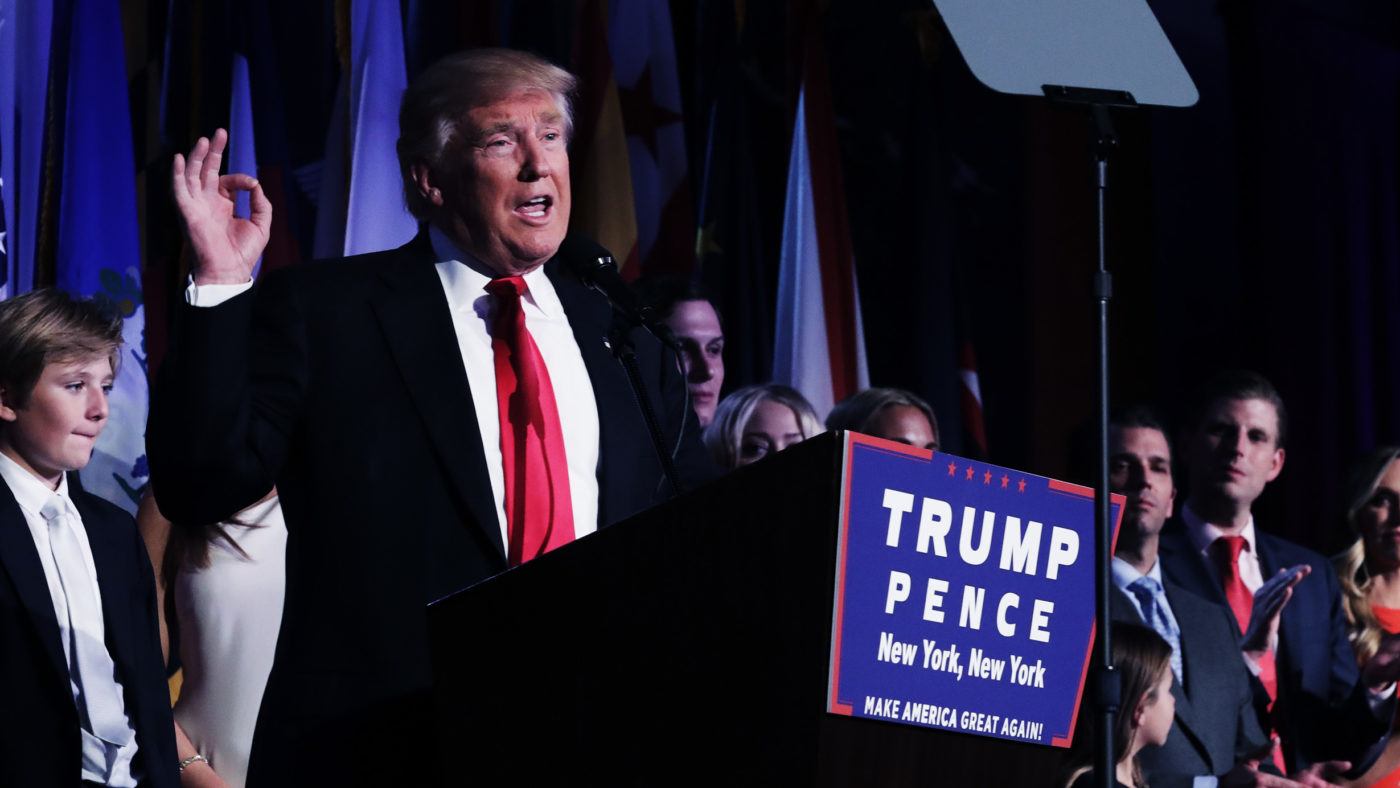Yesterday, millions of Americans voted for Donald Trump for president – for good reason. They are tired of sluggish economic growth, a weak image abroad, and political correctness run amok. They also feel betrayed by politicians who offer change but fail to deliver.
Just as in Britain, when voters chose Brexit rather than staying in the European Union, Americans rejected the political establishment, in favour of a non-politician who has run a business. Trump holds appeal not just because of his proposals, but because he is not afraid to call the proverbial spade a spade.
Coverage of the US election overseas has been rather one-sided. What those across the Atlantic may not have seen is how many Americans are appalled at the increasing censorship that is increasingly a feature of everyday life, constraining words so as not to offend.
Children cannot even dress as Native Americans (formerly known as Red Indians) for fear of being accused of “cultural appropriation”—taking someone else’s culture without permission. It is acceptable to make fun only of those who practice a religion and own guns. During the campaign Hillary Clinton called them “deplorables”.
Americans are also tired of slowing economic growth, which averaged 1.7 per cent in 2016, down from about 2 per cent in 2015. The share of prime-age workers who are working or looking for work has declined since President Obama took office.
The premiums for Obama’s required health insurance plan, known as Obamacare, will rise next year by an average of about 25 per cent, and over 60 per cent in Arizona. Schools hire more administrators at the same time as academic standards decline.
Clinton could not fully address these problems because they would mean admitting the failure of her predecessor, President Obama, who appointed her Secretary of State.
Trump, by contrast, has a policy platform that could not only reinvigorate the American economy, but would help spread growth beyond America’s borders. Here are six of his best ideas.
Tax reform
One way to invigorate an economy is through individual and corporate tax reform. Working with Congress, Trump proposes to simplify the tax code and lower individual taxes rates to three brackets, 12 per cent, 25 per cent, and 33 per cent, as well as eliminating the estate tax. This would give people more incentives to work and invest.
Lowering the corporate tax rate would be an even more powerful stimulus to growth. America’s corporate tax rate is one of the highest in the industrialised world, at 35 per cent. Moreover, the United States taxes companies on their worldwide income. Multinationals avoid this tax by keeping retained earnings, estimated at $2 trillion, abroad. Trump wants to lower the tax to 15 per cent, freeing this money to be invested in the economy.
Regulatory reform
Obama has added countless regulations that impede the creation of business. New companies such as Uber and Airbnb are immensely popular, but the Labor Department is issuing numerous regulations to limit these companies’ growth.
Banking regulations have prevented financial institutions from lending, even though interest rates have been at record lows. Trump’s plans to roll back these regulations draw much applause at his rallies.
Repealing Obamacare
The Affordable Care Act, which required Americans to purchase broad, expensive health insurance policies, is widely hated. Not only are premiums rising steadily – at an average of 25 per cent a year – but under the least expensive plans, families have to spend almost £10,000 before they can take advantage of the insurance.
The costs are rising because only people who are ill sign up for it, despite fines for non-compliance. Trump has promised to replace Obamacare with a more flexible system.
Energy development
One of the biggest contrasts between Trump and Clinton is their approach to energy production. Trump would allow states flexibility in expanding their natural gas and oil production: many such energy enterprises have been extremely successful. Over the past few years, the United States has moved from importing natural gas to being able to export it, and Trump’s plan would increase production.
School choice
Schools in inner cities have notoriously poor graduation rates, and Trump scored many points when he asked people living in inner-cities what the government had done for them. Trump has said, “We cannot continue to fail our children—the very future of this nation.” He advocates more school choice and competition among schools, rather than consigning children to failing schools.
More legal immigration
Contrary to popular opinion, Trump wants more legal immigration. He says, “We need to make changes to our laws to make it easier for those people who can contribute to this country to come here legally while making it impossible for criminal elements and other people get here illegally.” Allowing more immigrants into the country legally would increase economic growth.
Ultimately, millions of Americans believe that they are worse off today than they were eight years ago, and Trump’s proposals would improve economic growth. That’s why Trump has been elected the next president of the United States. If he delivers, the rest of the world will benefit, too.


